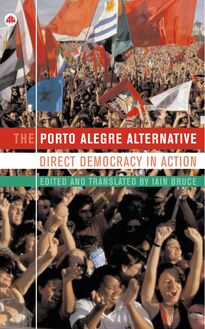The Porto Alegre Alternative , livre ebook
177
pages
English
Ebooks
2004
Obtenez un accès à la bibliothèque pour le consulter en ligne En savoir plus
Découvre YouScribe en t'inscrivant gratuitement
Découvre YouScribe en t'inscrivant gratuitement
177
pages
English
Ebooks
2004
Obtenez un accès à la bibliothèque pour le consulter en ligne En savoir plus
Publié par
Date de parution
20 septembre 2004
Nombre de lectures
3
EAN13
9781849644846
Langue
English
Poids de l'ouvrage
1 Mo
This is the first book in English that allows the creators of the participatory budget to explain the process for themselves - what it is, how it is achieved, what benefits it brings. Written by key figures from Porto Alegre - including the former mayor and the head of the City Planning Office - it provides a unique insight into the revolutionary democratic changes that have proved such a success. It is also a practical how-to-do-it guide that will help local communities and policy-makers put these ideas into action.
The Porto Alegre experience shows that a truly different kind of political democracy is possible - it presents a real alternative to the current model of liberal representative democracy that has been eroded by unelected transnational institutions and multinational corporations.
List of Tables and Figures
IIRE Notebooks for Study and Research
Foreword
Acknowledgements
List of Abbreviations
Prologue: The View from Below (Interview)
Part I. The Participatory Budget – Origins, Aims and Ambiguities (Iain Bruce)
1. Participatory Democracy - The Debate
2. From First Steps to Final Strategies
Part II. How It Works
3. Basic Principles (Ubiratan de Souza)
4. Porto Alegre: The City Budget (André Passos Cordeiro)
5. The PB in Two Other Cities (Interview with Edinho Silva; Pepe Vargas)
6. On a Bigger Scale: Rio Grande do Sul and nationwide (Ubiratan de Souza)
Part III. What It Means
7. Participatory Democracy and Local Power (Raul Pont)
8. Theses on Local Government and the Struggle for Socialism (Raul Pont)
9. The Question of Democracy Today (Raul Pont)
10. Socialism and the PT’s Experience in Local Government (João Machado)
Notes
Bibliography
Index
Publié par
Date de parution
20 septembre 2004
Nombre de lectures
3
EAN13
9781849644846
Langue
English
Poids de l'ouvrage
1 Mo

